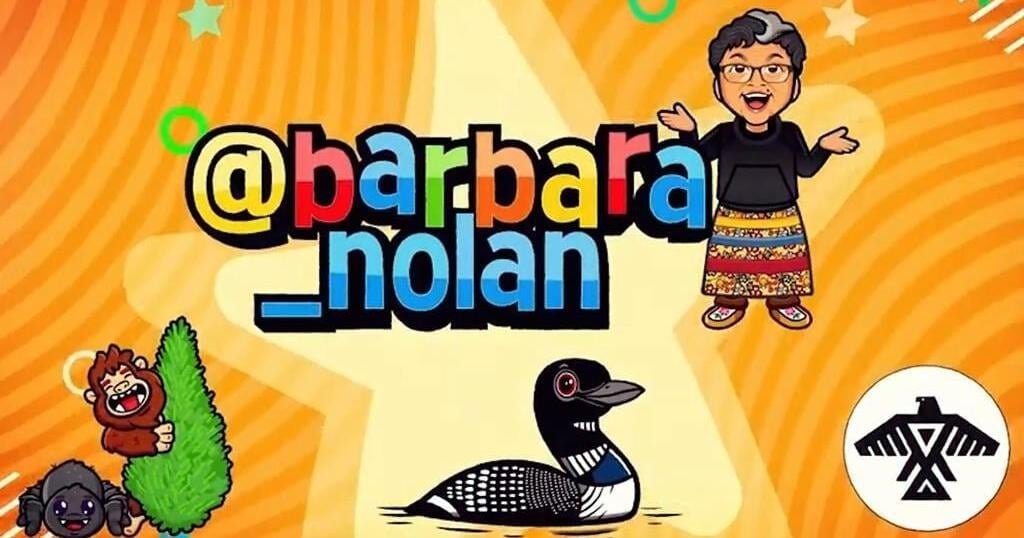Barbara Nolan, an Anishnaabe elder on a mission to promote her nation’s language, says she loves to hear stories about how her work is influencing children.
Nolan launched a series of online videos last month to introduce the language — called Anishinaabemowin — to the very youngest members of the community.
“I know this one grandparent, she sends me a picture of her grandchildren sitting on the floor and they’re watching a big-screen TV,” Nolan said in a recent interview from Garden River First Nation, east of Sault Ste. Marie, Ont. “And guess who’s on that big-screen TV? It’s me!”
In her videos, Nolan uses immersion techniques — instead of teaching the language, she encourages people to live it. Her content tackles a wide range of topics from Halloween to animals to the blight of residential schools, presented in a way that a child can understand.
Nolan, 77, is an elder born in Wiikwemkoong First Nation, and a residential school survivor. Growing up, she said, she heard her parents only speak Anishinaabemowin.
“I never heard my dad speak English or my mom for that matter,” she said. “And so we grew up hearing all this language — grandparents, aunties, uncles, neighbours, you know, the whole community.”
Nolan says many residential school survivors had their language taken from them, a dispossession she actively resisted but one that left an indelible mark on others.
“I would say they don’t want to speak it — even today,” Nolan said. “They know it, but they don’t want to speak it. It’s too painful for them. They think somebody is going to come and do something harmful to them … they’re going to be punished if you speak your language.”
Nolan has tried to buck that trend, working to revive and spread the language since the early 1970s. She works as a daycare language instructor in Garden River, playing with kids in Anishinaabemowin, introducing them to basic words. When the children she looks after start to speak for the first time, they sometime uses Anishnaabe words alongside English.
But those children, she said, aren’t immersed in the language; when they aren’t with her, they don’t speak it — or hear it. “And I thought, I think it’s about time that I did videos in the language, fun videos, animated videos.”
So she teamed up with Esbikenh, an Anishinaabe Grade 3 teacher in Walpole Island First Nation who creates digital characters. Together, they created online videos, presented on TikTok and other social media; she has even participated in the development of an application that teaches Anishinaabemowin.
Randy Morin, an Indigenous studies professor at the University of Saskatchewan, says there are about 63 Indigenous languages spoken in Canada and only three are expected to be around in the long term. “As you know, our populations are aging and they’re the ones that still speak languages, and unfortunately, we’re losing their languages very rapidly,” Morin said in an interview.
A major reason for language loss, Morin said, is federal government policy, including the residential school system. “But now it’s our aging population, our elders are passing away so fast and when they pass away, we lose so much: we lose language, we lose the values, our world view of how you see the world and interact with the world.”
Indigenous languages, he said, should be made official languages in Canada, so that they can receive funding proportional to the money that is invested in English and French programs across the country. “We lose our stories and we kind of lose the meanings of words that are so significant, so we need to hold on to these languages for a variety of reasons,” Morin said.
Indigenous languages, he added, can hold answers to pressing modern questions. The world’s last biodiversity-rich lands are owned and managed by Indigenous people, he said, whose languages are encoded with the techniques to manage the territory. The world may lose important knowledge about climate change and sustainable development when those languages are lost.
Knowledge, he said, is “embedded in the languages and how we look at the world, how we interact with the world. So we have much to lose.”
Nolan is trying to leave some of that knowledge behind. The first 10 videos were published online in August, with more to come. She intends to keep going for as long as she can — leaving behind something that can stand the test of time.
Locals in Garden River have told her how much they like the efforts.
“They will stop me on the street and they say, ‘Barbara, my little granddaughter, she likes your video. She just loves you, you know,’ and that is so rewarding for me to hear,” Nolan said.
“It’s for the kids. I have done that for the kids.”
This report by The Canadian Press was first published Sept. 27, 2024.
